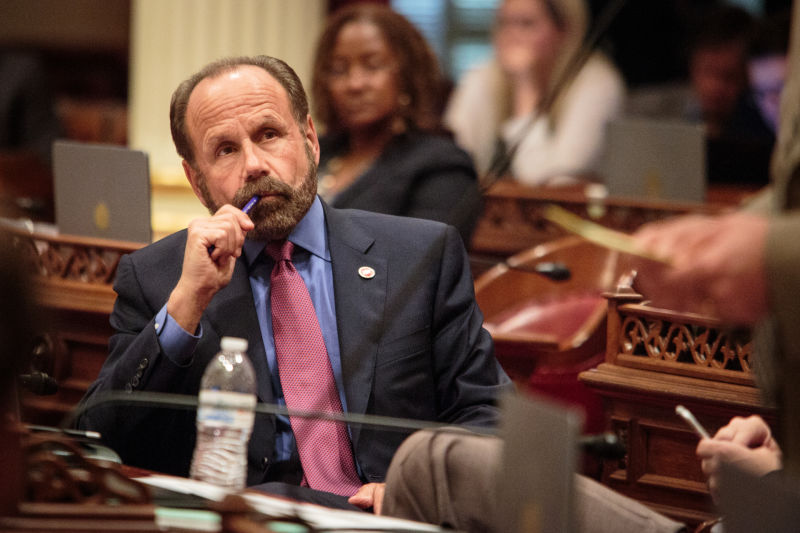Both times, state regulators found that the utility Southern California Edison was at fault. But the families of those killed were kept in the dark about many of the details -- in one case because the CPUC dragged its feet, and in the other because the utility refused to make public its internal investigation.
Now, state Sen. Jerry Hill, D-San Mateo, is asking why -- and he's introduced legislation that aims to make sure such secrecy won't happen again. Hill is among a group of lawmakers and others who have been critical of the CPUC and its relationship with utilities since a gas pipeline exploded in his district in 2010, killing eight people in San Bruno.
"You know everyone seems to characterize the relationship between the PUC and the utilities as cozy. Well, I think some of this, what we are finding out, shows not just a coziness but a collusion, and that’s the part that I think is most troubling," he said. "Collusion gets into what I look at as corruption, what I look at as something that could be dishonest."
Hill said the two electrocutions raise questions about how the CPUC operates during investigations of fatal incidents -- and whether it cedes power to the utilities.
"That’s really the concern. Is this a pattern? Do the utilities have the control of the PUC? If the utilities want to hold off on something, all they have to say is, 'It’s confidential,' " he said, arguing that both of the Southern California Edison cases indicate that utilities, not regulators, are controlling investigations.
"That really puts citizens at harm," he said.
San Bernardino Tragedy Raises Questions
Steven and Sharon Vego left behind two kids -- one of whom watched from inside the family house as her father, then mother and brother, all died in January 2011.
Within a few months, the surviving children filed a lawsuit and asked the CPUC for its investigation report. The CPUC voted in May 2011 to allow the release of that report. It was issued Dec. 17, 2012, and found that the incident was not only Southern California Edison's fault, but that it could have been prevented if the utility had responded to previous issues on the same electricity circuit.
But public records released by the CPUC show the agency didn't give the report to the Vego family until March 19, 2014 -- more than two years after the family settled its lawsuit with Southern California Edison. And the CPUC waited until five days after it had entered into a settlement agreement in which Southern California Edison admitted that it violated state regulations, that there had been similar incidents previously and agreed to a $16.5 million fine.
Hill said the delay put the family at a disadvantage in its lawsuit negotiations and that CPUC officials have told him they waited to give the Vegos the report because Edison claimed confidentiality.
On Tuesday, he sent a letter to CPUC President Michael Picker asking why the CPUC waited to provide the family with the results of the investigation, and charging that it may have violated state law by letting the utility see the results but not the Vego family.
In the letter, he asked whether the CPUC considers the situation an anomaly or "legal and appropriate under certain situations."
The delay, Hill told KQED, may have benefited Edison "because if facts had come out earlier, they could have been used to create a better settlement or a better case for the family."
Huntington Beach Case Sparks Legislation
Brandon Orozco was killed on Sept. 20, 2013, as he worked in an underground electrical vault owned by Southern California Edison. Orozco was an apprentice lineman for an Edison contractor, and thought the circuits in the vault had been turned off.
As in the San Bernardino case, the CPUC found Edison was at fault. But in that case, the CPUC itself had trouble getting information from the utility: In a letter, Southern California Edison refused to release its internal investigation into the incident, saying it was subject to attorney-client privilege.
Hill said that line of reasoning could allow any utility to claim any investigation into any incident is privileged.
"The law clearly states that the commission, and each commissioner, and anyone employed by the commission, can at any time inspect the account, book or documents of any public utility," Hill said.
He noted that it's not an isolated incident: Edison wrote in its letter to the CPUC that the regulator had never before objected to the argument of confidentiality. More generally, it is common practice for utilities to stamp documents as confidential -- forcing the full commission to vote on any document's release, a slow and onerous process.
Legislation Aims to Fix Issues
Hill is proposing two bills: Senate Bill 1049, which would require utilities to make their case before an administrative law judge -- or an appeals court -- anytime they want to claim the sort of privilege Edison did in the Huntington Beach case.
He also introduced Senate Bill 1017, which would let the CPUC develop rules about what information can be released without a vote of the full commission.
Gov. Jerry Brown suggested this sort of reform in his veto of more sweeping CPUC reforms last year.
